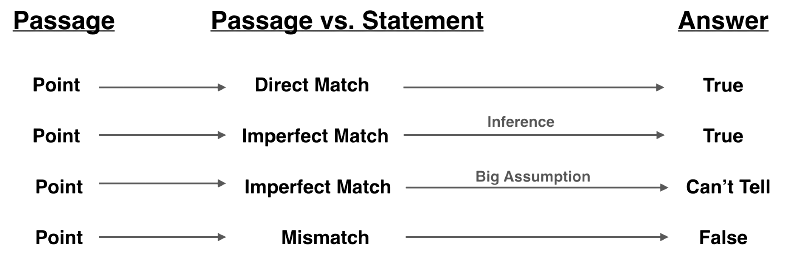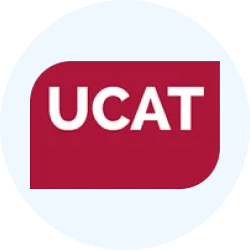Inferences | Verbal Reasoning for UCAT PDF Download
Introduction
- The recent endeavor to construct a new Library has proven to be a resounding success.
While we can acknowledge the positive impact the project has had on UCL and the quality of the medical school, it would be premature to declare it a complete success. Important factors such as costs, estimated project duration, and other related considerations remain unknown, making it difficult to assess its overall achievement at this stage.
Using Inferences

Example
Example 1:
Sports in UK Schools
During the annual Sports Conference on 17th February 2013, the Government was accused of neglecting school sports and undermining the Olympic legacy, just six months after the Games. Clive Efford MP, the Shadow Sports Minister, expressed his concerns to the BBC, describing the situation in school sports as a disaster. The Education Secretary, Michael Gove, is expected to announce a new strategy for school sports later this month.
Efford emphasised the need for a long-term strategy to integrate sports into schools, highlighting the potential problems that could arise for the economy and the NHS if no action is taken. Despite substantial investments in elite and community sports, the government has made some cuts in school sports. While they claim to be allocating £1bn to youth sports through Sport England over the next five years, they have abolished ring-fenced funding for the national School Sport Partnerships (SSPs) and no longer recommend two hours of physical education (PE) in schools every week. The SSP network used to facilitate the exchange of PE teachers between well-equipped secondary schools and those in need, particularly primary schools.
(i) Two hours of PE are no longer done at any UK schools.
(a) True
(b) False
(c) Can’t tell
Correct Answer is option (c)
The passage states that the recommendation for two hours of PE in schools has been ended. However, it does not provide evidence to conclude that no UK schools have two-hour PE sessions. The statement uses extreme language by saying "no schools" at all.
(ii) Michael Gove has some control over sports in schools.
(a) True
(b) False
(c) Can’t tell
Correct Answer is option (a)
Michael Gove is the Education Secretary, and he is expected to announce a new strategy for school sports. Therefore, it is plausible to infer that he has some control over sports in schools. If the statement used extreme language like "full control," it would be "Can't tell."
Example 2:
Bread, Ale, and Fermentation
The story of bread and cake begins with ancient cooks and progresses over time based on ingredient availability, technological advancements, economic circumstances, sociocultural influences, legal rights (Medieval guilds), and changing preferences. Initially, bread was made without yeast. Different cultures had variations in the type of grain, thickness, shape, and texture of their bread.
Archaeological evidence confirms that yeast was used in Egypt around 4000 B.C., both for leavening bread and brewing ale. Food historians generally agree on this period as the discovery of leavened bread and the birth of the brewing industry. However, there is an alternative theory suggesting that brewing may have started when the first cereal crops were cultivated. The accidental discovery of yeast's properties is widely accepted. Precisely dating the origins of beer remains a challenge, and some scholars propose that a taste for ale may have led to the beginning of agriculture, implying that brewing has been practiced for around 10,000 years. Most archaeological findings, however, indicate that fermentation in some form or another was being used between 4000 and 3500 B.C. Examples include evidence from an ancient Mesopotamian trading outpost named Godin Tepe in present-day Iran, where barley fermentation was observed around 3500 B.C. Similar evidence from Hacinegi Tepe, a site in southern Turkey, also suggests early barley fermentation by ancient Mesopotamians.
(i) Yeast was used in 4004 B.C
(a) True
(b) False
(c) Can’t tell
Correct Answer is option (b)
The statement suggests that yeast was used in 4004 B.C. The given text does not provide any specific information about yeast being used in that particular year. Therefore, it is not possible to determine whether yeast was used in 4004 B.C.
(ii) Some historians believe that cereal crops are responsible for the beginning of brewing.
(a) True
(b) False
(c) Can’t tell
Correct Answer is option (a)
According to the given text, some historians believe that the cultivation of cereal crops played a role in the beginning of brewing. Therefore, it is true that some historians hold this belief.
(iii) Hacinegi Tepe is only found in Northern Turkey
(a) True
(b) False
(c) Can’t tell
Correct Answer is option (b)
The statement claims that Hacinegi Tepe is only found in Northern Turkey. However, based on the given text, Hacinegi Tepe is described as a site in southern Turkey. Therefore, it is false that Hacinegi Tepe is exclusively found in Northern Turkey.
(iv) It can be assumed that yeast was discovered accidentally.
(a) True
(b) False
(c) Can’t tell
Correct Answer is option (a)
The given text states that the discovery of the powers of yeast was accidental. Therefore, it can be assumed that yeast was discovered accidentally.
Example 3:
£60 Penalties for Late School Attendance
Local councils are taking stricter action against students who are consistently late for school, and parents who fail to pay fines may face legal consequences. Several areas in the West Midlands, Hampshire, and Essex have extended the £60 fixed penalties, originally issued for absences such as term-time holidays, to include cases of lateness.
Warwickshire county council has provided guidelines stating that families can be fined if their children are frequently late, defined as arriving more than 30 minutes after the registration is taken. Winter Gardens Academy in Essex has informed parents that they may be fined £60 for their children consistently arriving after 9 am, with the amount increasing to £120 if not paid within 21 days.
According to the government's behavior advisor, measures to improve punctuality could involve assigning tasks such as litter collection, chewing gum removal, or classroom floor mopping to students before school, a practice seen in South Korea, which often excels in academic rankings. Fines are considered a last resort. Tom Bennett, the behavior advisor, suggests that parents should walk with their teenage children who are frequently late. He adds humorously, "Most pupils would rather lose an arm than be seen walking up to school with their parents." Bennett himself confesses that he was late for school every day during his A-level studies. He also believes that the increased use of technology has contributed to more students staying up late, as many are engaged with their phones.
(i) Which of the following statements is false?
(a) The introduction of a fine has effectively decreased instances of lateness at school.
(b) South Korea has a commendable educational system.
(c) The highest penalty for lateness is £60, provided it is paid within 21 days.
(d) Penalties for lateness are currently implemented in three districts in the UK, including Essex.
Correct Answer is Option (a)
The introduction of a fine has effectively decreased instances of lateness at school. The passage does not provide any information about the effectiveness of the fine in decreasing instances of lateness. It only mentions that local councils are taking stricter action and implementing fines for lateness.
(ii) Which of the following strategies to address lateness are absent from the passage?
(a) Require parents to accompany their children to school on foot.
(b) Mandate students to come in on weekends for floor mopping and litter collection.
(c) Implement monetary penalties.
(d) Instruct students to remove chewing gum.
Correct Answer is Option (b)
Mandate students to come in on weekends for floor mopping and litter collection. The passage mentions assigning tasks such as litter collection, chewing gum removal, or classroom floor mopping to students before school, but it does not specify that this should be done on weekends.
(iii) Walking to school with their parents is a more undesirable option for most students compared to having their arm amputated.
(a) True
(b) False
(c) Can’t tell
Correct Answer is Option (c)
It mentions that most pupils would rather lose an arm than be seen walking up to school with their parents, but it does not provide a direct comparison to having their arm amputated.
(iv) The utilization of technology has resulted in students staying awake for longer periods.
(a) True
(b) False
(c) Can’t tell
Correct Answer is Option (c)
While the passage mentions that the increased use of technology has contributed to more students staying up late, it does not explicitly state that it has resulted in students staying awake for longer periods.
|
7 videos|15 docs|30 tests
|
















